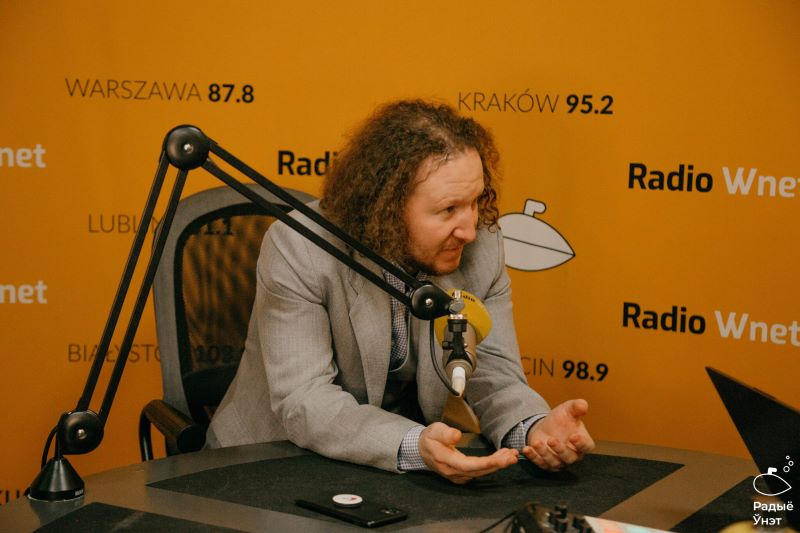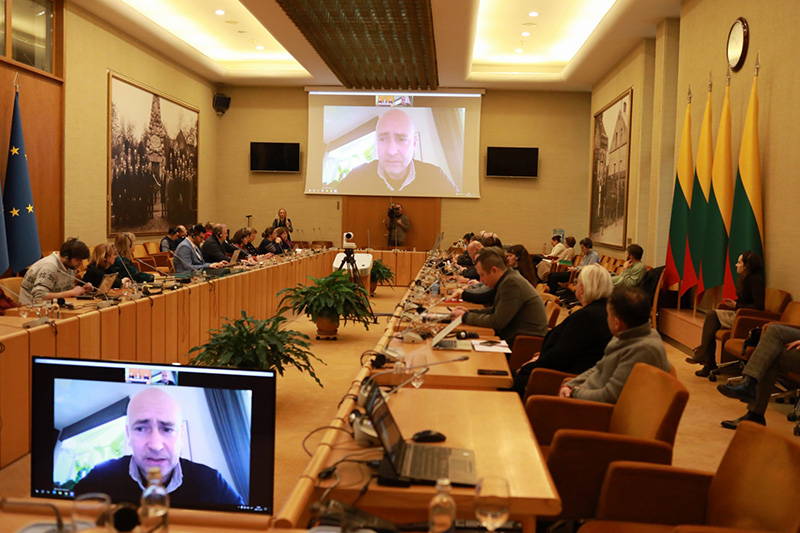«Belarusian media funding is declining, while competition from Russian media is on the rise.» Is there a solution?
The troubling case of the KYKY website is not an isolated event. Many independent media outlets are likely to experience funding problems shortly. After three years of working in exile, the Belarusian media has entered another turbulent period. Not all of the outlets will successfully navigate this period. But is there a way out?

Why did the problems arise now?
In private and public meetings, there is much discussion about the necessity of sustainable funding models. But it’s hard to call the grant system one. First, unlike the advertising model, grant opportunities are highly diversified. For instance, last year, there was a grant call, but this year there is none. As a result, the media must often seek out new programs. Second, only state programs typically offer a public bid for accepting applications.
Now there is much talk of formalities and shortcomings in grant applications. However, these projects have existed for years, so the managers likely have the necessary experience to prepare the applications correctly. What’s changed?
«In the first months after the relocation, Belarus received significant attention from the world. Both short- and long-term support programs were available. That offered some wiggle-room for survival,» recalls Barys Haretski, BAJ deputy chairman.

However, after the outbreak of a full-scale war in Ukraine, the situation changed dramatically.
«Some donors consider Belarus to be part of the same package as Russia’s liberal media»
There is another important factor to consider. Belarusian media managers are paying more attention to competition from neighboring media outlets. These outlets also compete for resources to support independent journalism.
«The decrease in funding for Belarusian media is evident from recent developments,” says Barys Haretski. «This is partly due to some donors considering Belarus to be part of the same package as Russia’s liberal media. The contest has strict requirements, but it does not consider the local situation.
For example, one grant had a condition that a media’s reach should be at least 1 million people. However, discussing a country with an official population of 9.3 million is different from discussing a state with a population of 143 million. 15 times the difference!”
Considering audience reach as a percentage rather than quantitative metrics is logical in this case. Otherwise, it can end up like in an old anecdote about two athletes: the American finished second to last, as reported by the USSR radio, while the Soviet runner trailed slightly behind the leader.
According to the Belarusian Analytical Workshop, 57% of the Belarusian population trusts independent mass media. Despite the criminalization of journalism, Belarusians are receptive to alternative sources, according to sociologists. The regime’s efforts to establish information hygiene have been titanic, but rather unsuccessful.
The question arises: Can Russian liberal media provide objective and comprehensive coverage of events in Belarus?
The formal approach highlights a concerning and perilous reality: some donors fail to recognize our independent media as a distinct entity. Despite numerous appeals and the efforts of democratic leaders, some individuals refuse to acknowledge the difference between Belarusians and Russians.
This is exactly what Pavel Sviardlou, editor-in-chief at Euroradio, said recently:
«Europe is starting to adopt the approach considering ‘media in exile,’ regardless of their country of origin, such as Belarus or Russia. We are pooled together and money is allocated for all of us. Evaluated by coverage. However, it is not appropriate to compare a million YouTube followers of Russian media with a million followers of Belarusian media.
Additionally, Russian media claim to be able to reach out to Belarusian followers, too. European politicians are happy with this: problem solved.

But can Russian liberal media provide objective and comprehensive coverage of events in Belarus? Do they have the resources, the understanding, and most importantly, the desire? Apparently not.
The way they presented the latest news about the problems of pessimization of independent Belarusian media in Google search results, to which Media IQ drew attention, is concerning. Russian media reprinted the Financial Times news and shifted the focus, distorting the information. Allegedly, the restrictions concerned both the Russian Federation and Belarus, although this is not true. In the original piece, Russia was not mentioned at all.
«Some independent media outlets have enough funds to cover one or two months of work»
To objectively assess the processes, we can consider the number of Russian media projects that emerged after the full-scale invasion, such as Astra, Verstka, Dron, Project, and others.
What is the situation with the Belarusian media sphere? BA, the first private radio station in the city, lnfa-Kurier, the Slutsk district edition, Ranak TV channel, and Dzejaslou literary magazine were closed down. Recently, Reform.by, Plan B, KYKY media outlets have reported problems with funding. The list goes on…
“Some independent media outlets have enough funds to cover one or two months of work,» expresses the general concern Barys Haretski.
Common trends in the media industry include the atomization of media and journalists, with many starting their own projects. Others leave the profession for related fields, such as working in NGOs or social media marketing, or other sectors, such as IT. Some journalists also find work in other jurisdictions, such as getting a job in the media of their host country. A well-known example is when Belarusian journalists opened a new media outlet dedicated to local topics in another country, DigitalBusiness.kz.

Of course, all these are demotivating processes that do not benefit the independent media sphere. Sponsors are more willing to fund Telegram and YouTube channels due to their small team size, low funding requirements, and wide reach. However, these channels rely on traditional media as a source of verified and objective information.
«We will not stop saying that Belarusian independent journalism is worth supporting»
Independent Belarusian publications are facing an unprecedented challenge. They are working in exile and cannot generate revenue independently. Is there a way out?
«How can the media survive?» Barys Haretski admits this is a difficult question. «Independent media in Belarus used to make money through advertising, but these are not easy times. Many publications are now labeled as ‘extremist’ and are therefore unable to receive support. Companies in Belarus are hesitant to engage with these publications due to the criminalization of any interaction with ‘extremists.’
Some media sites have advertisements, but they only generate a small portion of the revenue. There’s no way to survive on this money.
The same goes for financial support from readers. That wave of solidarity went down after 2020 for obvious reasons. The surge of donations will sustain Reform.by and Plan B (following their SOS cry) in the short term. However, relying solely on short-term solutions is not sustainable.”
Integrating media projects is believed to be helpful in times of necessity. However, there are currently no successful examples. A joint project involving Malanka Media and Euroradio has just been announced, but there are no specific outcomes yet.
If journalists start making money from other services, such as educational services, it will mean less work for the media.
“This is not an effective approach,» says Barys Haretski. «Replacing a fundamental professional function is not advisable. Today, the mass media is not just a business, but a social mission to deliver free and important information to Belarusian society.”
Lithuania’s journalists survived abroad during the Soviet era, as we can see from their experience. An ecosystem of companies and organizations founded by the diaspora in America and elsewhere was created. However, it takes time for Belarusian relocators to recover from the shock of forced emigration, and their priority is to maintain their cause.

“The sale of branded items and other methods of monetization do not generate sufficient income to cover the monthly salary of even one employee,» according to the deputy chairman of BAJ.
Therefore, independent media can only rely on donor support. If for some reason a partner reduces support or abandons the Belarusian topic altogether, it will become even more difficult for journalists. The last opportunity is to draw attention to it in the public space.
“Belarusian media have a longer history of success and more effective work than Russian liberal media. BAJ states this on all possible platforms, including official meetings with the EU, joint calls with large foundations, and conversations with private donors,» summarizes Barys Haretski. «For example, during the December meeting of the European Parliament’s Delegation for relations with Belarus, Andrei Bastunets drew the MEPs’ attention to the problems of the mass media. Belarusian independent journalism is worth supporting. We appreciate everyone who helps us.»
Read more:
Former videographer Yauhen Hlushkou detained in Mahiliou
RockRadioBY launched in Ukraine
The most reassuring thing is getting feedback from the audience». Belarusian independent media’s take on the year’s results and their plans for the future
 @bajmedia
@bajmedia
